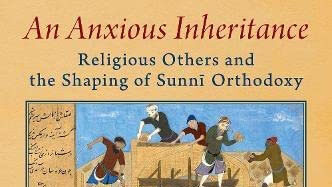
27 Mar Book Review by Mark Durie: An Anxious Inheritance: Religious Others and the Shaping of Sunni Orthodoxy by Aaron Hughes.
New York: Oxford University Press, 2022. 264 pp. $99. Published in the Middle East Quarterly, Winter 2023.
Hughes, a professor of religious studies at the University of Rochester, views the genesis of Islam through a religious studies lens. He characterizes Islam’s “quest for normativity” in its early centuries as an “eminently political and ideological,” psychologically-driven project of late antiquity in which Sunni orthodoxy emerged gradually from fluid beginnings.
Hughes contends that, to articulate the faith of Islam, Muslims reimagined preexisting religions, driven by an “anxiety” due to similarities between Islam and those other faiths. To alleviate this anxiety, Muslims had to “differentiate the new community from those that came before”: they were “extracting” Sunni orthodoxy “out of a complex set of comparative procedures.”
Thus was early Islam’s take on other faiths a literary creation driven by a need for self-definition: “actual Jews and actual Christians were reduced to safe literary stereotypes, where they could now be marginalized and be both actively and legally resisted.” Early Islam’s portrayal of the life of Muhammad, likewise, was “not a work of history, but one of hagiography.” This also accounts for Sunni orthodoxy’s dismissal of “heretic” Muslims.
Hughes carefully avoids negative judgments of the Sunni orthodoxy he exposes. Three examples:
First, he characterizes Muhammad’s claim that Jews exist under God’s wrath and Christians have gone astray as merely “cynical.” His apology for the “intensity” of this characterization is that “the early Muslim community needed to define itself,” and “the only way to do this was to prevent Muslims—and of course non-Muslims—from mistaking the new religion for its predecessors.” In the case of Judaism, this was “not anti-Semitism” but a “natural process” of self-differentiation.
Second, Hughes ascribes Islam’s supersessionism (i.e., its abrogating what it claims to replace) to anxiety. But could not other motivations, for example, the will to dominate, better account for this?
Third, he insists that the Qur’an projects “a doctrinally underdefined Islam” with semantically vague categories. But did not Islamic supersessionism endure for precisely the opposite reason because Qur’anic theology was grounded in clearly defined concepts?
Hughes’s thesis that Sunni Islam reduces non-Muslims and “internal others” to literary fictions is compelling and a challenge to Islamic studies’ uncritical acceptance of polemical sources, but his psychological explanation is less convincing.


No Comments